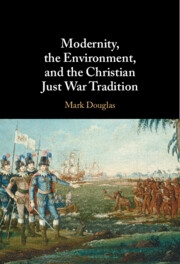Book contents
- Modernity, the Environment, and the Christian Just War Tradition
- Modernity, the Environment, and the Christian Just War Tradition
- Copyright page
- Contents
- Acknowledgments
- Introduction: Troubling a Tradition
- 1 Engaging the Other
- 2 Understanding the Self
- 3 Shaping the State
- 4 State Time/Secular Time
- 5 Christian Just War Thinking and Modernity
- 6 Historical Roots and Roads Not Taken
- 7 Renarrating the Christian Just War Tradition
- Afterword
- Select Bibliography
- Index
2 - Understanding the Self
Hugo Grotius and the Birth of the Secular
Published online by Cambridge University Press: 05 May 2022
- Modernity, the Environment, and the Christian Just War Tradition
- Modernity, the Environment, and the Christian Just War Tradition
- Copyright page
- Contents
- Acknowledgments
- Introduction: Troubling a Tradition
- 1 Engaging the Other
- 2 Understanding the Self
- 3 Shaping the State
- 4 State Time/Secular Time
- 5 Christian Just War Thinking and Modernity
- 6 Historical Roots and Roads Not Taken
- 7 Renarrating the Christian Just War Tradition
- Afterword
- Select Bibliography
- Index
Summary
In On the Rights of War and Peace, Hugo Grotius (1583–1645) pushes natural law thinking into an international law form, shaping not only the origins of international law but a particular vision of the nation-state as the primary political form of modernity. Along the way, he frames the conditions through which just war thinking will move from being a tradition into becoming a theory (with its preoccupying focus on jus ad bellum and jus in bello criteria) and the modern self will become the primary political agent. One implication of his revolutionary thought is that it gives license to colonizing powers to use military force to acquire and defend property, especially the resources of the new world, thereby shaping modern understandings of the natural world as composed of things that can become owned. Another is that it makes refugees all-but-invisible, which will create increasingly acute problems as climate change and violence, together, will dramatically increase the number of displaced persons in the world.
Keywords
- Type
- Chapter
- Information
- Publisher: Cambridge University PressPrint publication year: 2022

